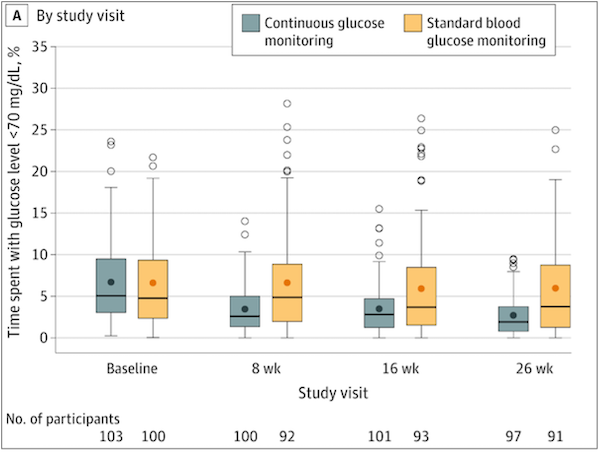Effect of Continuous Glucose Monitoring on Hypoglycemia in Older Adults with Type 1 Diabetes: A Randomized Clinical Trial
The Wireless Innovation for Seniors with Diabetes Mellitus (WISDM) study, published in the Journal of American Medical Association in 2020,1 was one of the first randomized control continuous glucose monitor Clinical trials to assess whether Dexcom CGM use was more effective than the self-monitoring of blood glucose (SMBG) in reducing hypoglycemia in older adults with type 1 diabetes (n=203, >60 years of age). Compared with the SMBG control group, here are the results of the efficacy of CGM on hypoglycemia in T1D older adults:
-
Median percent time <70 mg/dL decreased from 5.1% (73 minutes per day) at baseline to 2.7% (39 minutes per day) at the 6-month follow-up for the CGM group. By contrast, hypoglycemia exposure remained relatively unchanged for the SMBG group—from 4.7% (68 minutes per day) at baseline to 4.9% (70 minutes per day) during follow-up—for an adjusted treatment group difference of −1.9% (95% CI, −2.8% to −1.1%; P <0.001).
- This Dexcom clinical trial result corresponds to a significant reduction in hypoglycemia of 27 minutes per day (P <.001).
-
Reduction in hypoglycemia in older adults observed in the CGM group was independent of baseline characteristics, including age (<70 vs ≥70 years), socioeconomic status, presence of cognitive impairment, or A1C.
-
Mean time spent in the target range of 70 to 180 mg/dL was 8.8 percentage points (2.1 hours per day) higher in the CGM group compared with the SMBG group (P <0.001).
-
Baseline A1C was relatively low. However, the study on the CGM group of older adults with Type 1 diabetes observed a small but statistically significant decrease in mean A1C (adjusted group difference, −0.3%; P <0.001).
-
Adherence to CGM was high; 83% of users wore their Dexcom CGM >6 days per week.
Percent of time spent of T1D older adults in hypoglycemia (<70mg/dL) by study visit

Prescribe Dexcom G6 to your patients or request a personal cgm sample.
1 Pratley RE, Kanapka LG, Rickels MR, et al. Effect of Continuous Glucose Monitoring on Hypoglycemia in Older Adults With Type 1 Diabetes: A Randomized Clinical Trial. JAMA. 2020;323(23):2397–2406.
Related Content
Topic: Behavior Change, Type 2 Diabetes, Lifestyle Modification Key question: Could glucose sensor use lead the individual to make significant dietary or activity changes, or perhaps encourage optimal...
Topics: Type 2 Diabetes, Cardiovascular Outcomes, Behavior Change Key question: What are the potential benefits of widening the application of glucose sensors in type 2 diabetes? Research Spotlight:...
